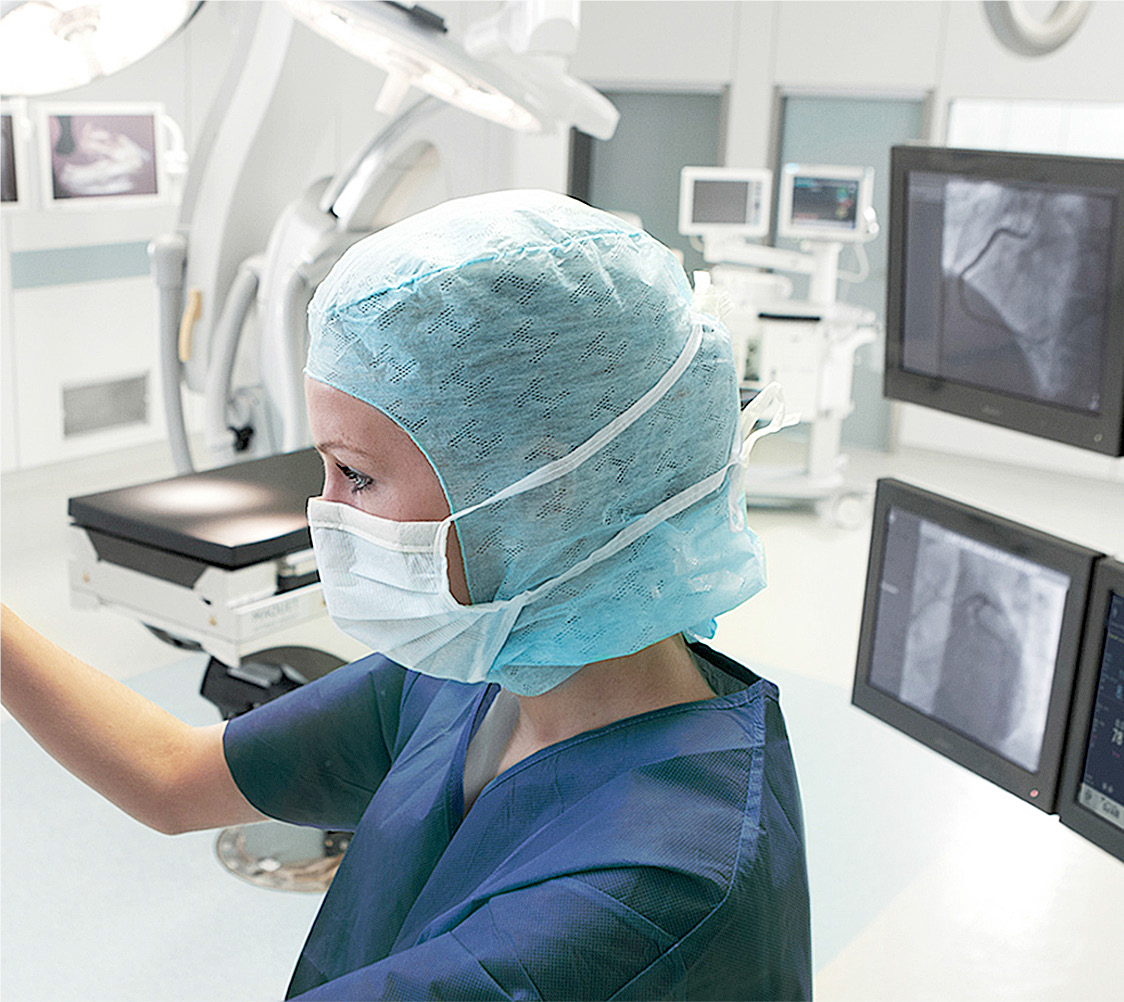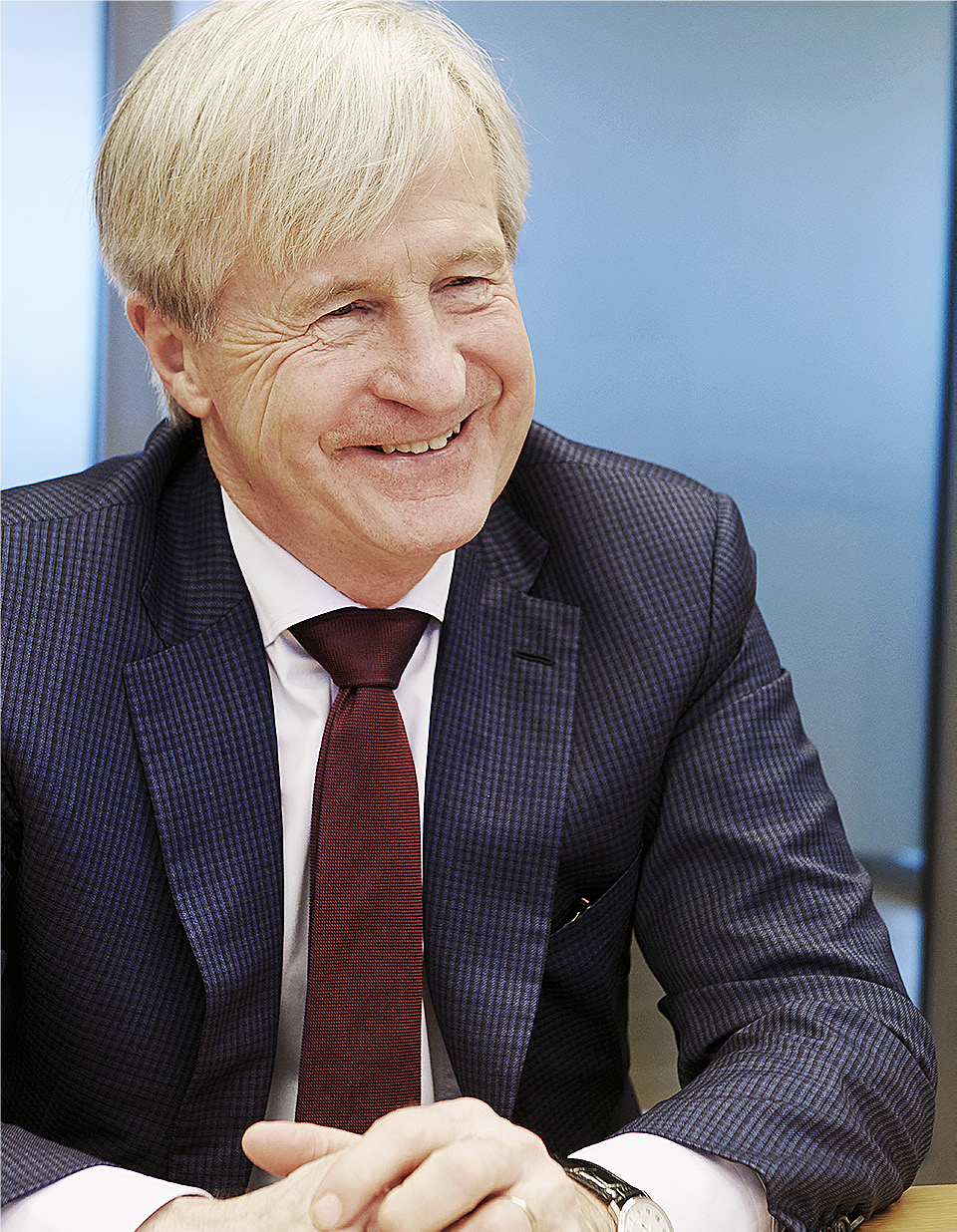Asking the right questions saves lives
The fields of health, healthcare, medicine and medical technology are currently in the midst of a paradigm shift. Matti Ahlqvist from AstraZeneca in Gothenburg and the industrialist Carl Bennet believe that we are standing on the brink of a whole range of medical breakthroughs, and that the humanities and natural sciences must align more closely with each other if we are to understand the world better.

“The knowledge that we make equipment that saves lives on a daily basis, all around the world, is an extremely motivating factor”, says Carl Bennet, who is the main owner of the listed life-science companies Getinge, Lifco and Arjo. He points to a newspaper report in Dagens Industri on how employees at Getinge, in the eye of the coronavirus storm in Wuhan, are working to ensure that emergency healthcare equipment reaches those who need it. This proved to be just the beginning.

Carl Bennet is the epitome of calm when we meet, right at the beginning of the coronavirus outbreak – not to mention the worst stock market crash since the financial crisis. With a share portfolio worth around SEK 36 billion, many would be feeling the pressure on such a day, even if the global demand for medical and emergency healthcare equipment is making Getinge one of the market’s winners.
The industrialist has become well-known for his long-sighted approach, whether with regard to shares or his companies. Now, as Sweden’s biggest ever life-science cluster is emerging in Gothenburg under the name GoCo Health Innovation City, Carl Bennet is pleased to see a company as large as AstraZeneca taking the leading role in driving this initiative forwards. AstraZeneca has taken the initiative and is supporting the project in which SEK 3.5 billion is being invested, where the property companies NextStep and Vectura also have key roles. It has taken just 2.5 years from the initial idea to the beginning of the building of 100,000 m2 of premises for companies working within the fields of health, medicine and medical technology.

Matti Ahlqvist identifies two areas where the industry both faces challenges and has the ability to create opportunities in order to make healthcare more sustainable.
“Digitalisation enables us to conduct research and to process data in completely new ways, with greater precision and providing patients with opportunities to have even greater awareness of the state of their own health.
“Scientific breakthroughs in the fields of biology and genetic modification have led to the emergence of new treatments. This involves the ability to recreate damaged tissue, but, above all else, it enables a greater degree of personalised treatment.”
The transfer of knowledge within pharmaceutical development, care and health has its own unique challenges, where quick-fix solutions are conspicuous by their absence. Mentorship and knowledge transfer constitute assets that need to be protected.
“The foundation is the in-depth scientific knowledge and the ability to centre the focus on the patient. In addition, there is a need for drive, an entrepreneurial spirit, curiosity, collaboration, networks and capital”, explains Matti Ahlqvist. “Much greater resources also need to be allocated to prevention and to the integration of the entire care chain if we are to attain sustainability in both the funding and provision of healthcare. In this regard, digital and medical-technological solutions are of crucial importance, but so is the cooperation between people with skills in the fields of medicine, technology and behavioural science.”
There are many flowers that need to blossom, is how Carl Bennet describes the situation. The fact that major, vibrant companies working within life science are owned in Sweden creates much more than just value on the stock market.
“The revolutions we are facing within health and medical care are so profound that no one actor can alone possess all the skills that are required in order to ask the right questions, or to find the right solutions”, says Matti Ahlqvist.
According to Carl Bennet, Swedish medical care has many positive qualities, but we need to become much better at making the best use of resources: “Patients need to spend more time with a doctor. This would be to everybody’s benefit – even just in terms of following up on quality and accessibility.”
It is not only the time spent meeting patients that needs to be significantly increased – the same also applies to medical research, according to Bennet: “Why can’t we just decide to increase the funding for medical research from 1 per cent to 2 per cent of GDP? If we increase public funding to universities for research, this will be matched by industry. Sweden needs to be more daring.”
Another key consideration concerns the people that work in health and medical care – do they feel adequately remunerated? Carl Bennet believes that decentralisation is one way of resolving this.
“Give people the trust to resolve the challenges they face. Workers need to be able to have an influence and be allowed to grow in their roles and responsibilities – for example, by improving the workflows when it comes to treating patients.”
The pressure on health and medical care systems is not likely to decrease. According to Carl Bennet, this demands greater collaboration between the academic community and the public and private sectors: “Getting this cross-disciplinary cooperation to work releases a powerful force.”
When Carl Bennet looks back at his life and is asked if there’s anything he would like to have done differently, he says that he would like to have incorporated more humanities studies alongside his study of economics: “Yes, and I would wish the same for others, too. We cannot explain everything using only science and mathematics. If people are to be able to understand the world in the future, education must increasingly combine science with humanities.”
By its very nature, health is a global issue – this is something we have learned from the COVID-19 crisis. Universal access to healthcare is the third of the UN’s 17 Sustainable Development Goals, as part of Agenda 2030.
“Historically, Sweden’s ambition to create universal access to healthcare has earned international respect.”
Carl Bennet thinks that this provides us with a great advantage when we are involved in establishing healthcare systems in other countries: “Or, as Hans Rosling said when he visited Getinge, just six months before his untimely death: ‘It’s about being outside in the real world, and being able to see beyond today’s reality’.”
The field of life science currently represents around 10 per cent of Sweden’s export revenue. What can industry do in order to strengthen the sustainability of Sweden’s exports?
“It is important to make use of the Swedish collaborative spirit, and to combine this with international cooperation. On a global scale, our industry helps to promote Agenda 2030’s Sustainable Development Goals – in particular goals 3 and 9, which concern sustainable industry and innovation”, explains Matti Ahlqvist. “The most important reason for investing in a new ecosystem for the life-science sector is that it enables us to save people’s lives – a great many lives.”
More information about life science in western Sweden:
The life science sector in western Sweden employs more than 9,400 people. Small and medium-sized companies in particular are experiencing rapid growth. In the Gothenburg region, around 33 per cent of companies in this sector work with medical technology, 22 per cent work with pharmaceuticals and biotechnology, and 45 per cent work with other aspects of life science. It is also here that AstraZeneca has one of its three global research facilities, which employs 2,400 people in Gothenburg and channels research with an annual value of SEK 15 billion.
ODONTOLOGY AND BIOMATERIALS
Per-Ingvar Brånemark’s discovery that bone tissue can grow quickly in materials that do not belong to the person’s own body has received widespread attention. His idea of dental implants has been commercialised in the company, Nobel Biocare.
SAHLGRENSKA SCIENCE PARK
The Science Park connects 90 or so companies – many of which enjoy global success – to the innovation environment around Sahlgrenska University Hospital. Entrepreneurs, global companies and investors work together on issues of care and healthcare, academic research and in many other creative areas.
SAHLGRENSKA UNIVERSITY HOSPITAL
With leading expertise in around 25 different specialisations, the hospital treats patients from all over Sweden. The paediatric heart clinic at Queen Silvia’s Children’s Hospital has been designated as the national centre for such care. Up to around 1,950 patients are treated across 120 or so wards. A total of around 16,000 people work at the hospital, which makes it one of the biggest employers in the county of Västra Götaland.
STEM CELL RESEARCH, CELL THERAPY AND REGENERATIVE MEDICINE
These are areas in which the Gothenburg region is at the forefront, as are the areas of cardiovascular and metabolic health and vaccines. The first successfully completed pregnancy from a transplanted womb made headlines all around the world, and this advance was based on research that had been performed in Gothenburg.
MEDICAL TECHNOLOGY
This field – particularly with regard to implants and biomaterials – is strongly represented in the region by companies such as Dentsply (previously AstraTech) and Nobel Biocare. Cochlear is a company that develops hearing implants, and conducts research and development work in the Gothenburg region. Cochlear previously took over the Gothenburg company Entific, which, in turn, had its roots in research conducted by Nobel Biocare.
MEDICAL ACHIEVEMENTS
The world’s most sold pharmaceutical product – the treatment for gastric ulcers, Losec – was developed in the Gothenburg region, as were effective treatments for Parkinson’s disease. The latter were developed by a collaboration between the pharmaceutical industry and Professor Arvid Carlsson, who was awarded the Nobel Prize in Medicine in 2000.
This article was originally printed in Magasin Göteborg 2020. Magasin Göteborg is published by the Trade and Industry Group at Göteborg & Co and Business Region Göteborg. The theme of Magasin Göteborg 2020 is ”Sustainable growth – for everyone”.
Text by Ulrica Segersten. Photos: Tommy Hvitfeldt, AstraZeneca & Getinge. Translation by Språkservice.
